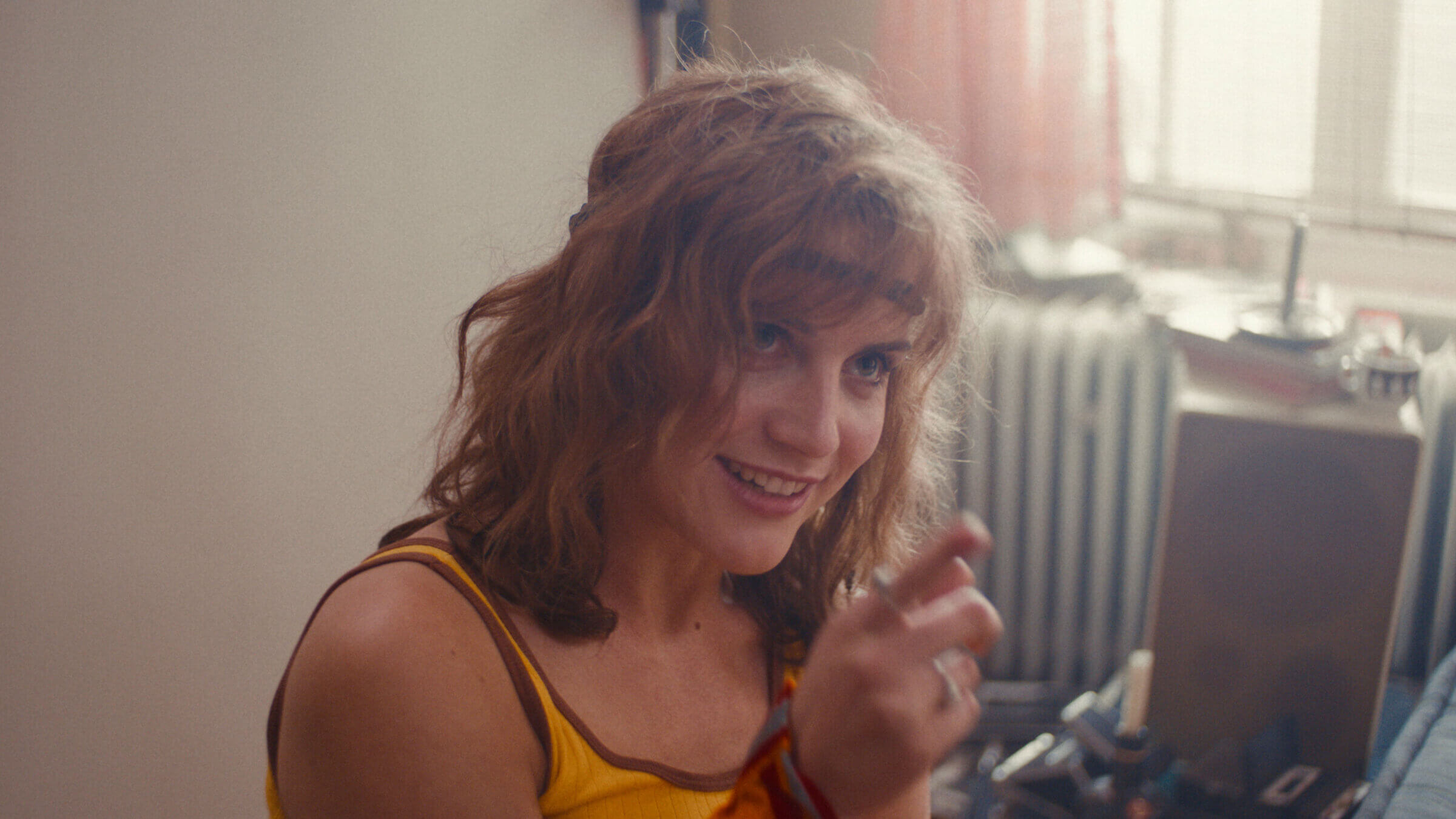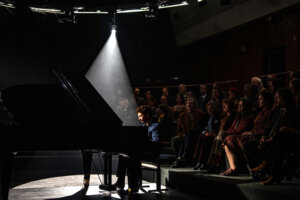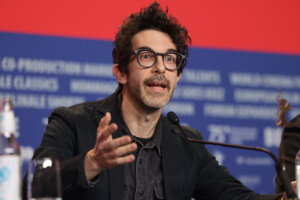How a complete unknown created one of the most iconic music events of the 1970’s
Ido Fluk’s ‘Köln 75’ tells of the unlikely collaboration of jazz great Keith Jarrett and teenage concert promoter Vera Brandes

Mala Emde stars as Vera Brandes in ‘Koln 75.’ Courtesy of Zeitgeist Films
“I’ve always been a stranger,” Ido Fluk told me when I met him in a near-empty conference room in a sleek, Nordic-designed hotel in Berlin this past February. It was the afternoon after the Berlin Film Festival’s world premiere of the Israeli director’s German-language film, Köln 75, a kinetic behind-the-scenes look at Keith Jarrett’s famous live album, The Köln Concert. Jarrett improvised the hour-long set at the Cologne Opera House on Jan. 24, 1975, on a substandard piano — a beat-up baby grand rehearsal piano instead of the 10-foot-long Bösendorfer Imperial he’d been promised.
The film has grossed over a million dollars at the German box office — no mean feat for a domestic production — and was nominated for four Lola awards (Germany’s version of the Oscars) including Best Picture.
Fluk, 40ish, with tousled hair and a thick mustache, stubble and round, dark-framed glasses, had a peripatetic upbringing. Born in Tel Aviv, he was raised both there and in Paris, where his family relocated for five years during his childhood. Just shy of 20, he moved to New York City to study at N.Y.U.’s Tisch School of the Arts.

He returned to Israel to shoot his first feature film, Never Too Late (2011) about a young Israeli man who comes home after eight years in South America and takes a road trip in his 1985 Volvo through the country he left behind. It holds the unusual distinction of being the first crowd-funded Israeli film and won the main prize at the Fribourg Film Festival. Fluk shot his next film, The Ticket (2016), about a blind man who regains his vision, in Kingston, New York. Köln 75 was filmed largely on location in Cologne.
“I’ve always been, like, moving around. So for me, it’s very natural to go to a new country to make a film,” said Fluk. “I also think it’s the story of cinema a little bit these days where art house cinema in the States is kind of a dying breed. You see more and more filmmakers from the U.S. traveling to Europe.”
“And, you know,” he added, “it’s also kind of the story of Keith Jarrett in the 70s, which is that jazz musicians were losing their audiences in the States, and they started coming to Europe, because in Europe they still found an eager audience for their work. So I could identify with that, in a way.”
Fluk was wearing a black T-shirt for the British punk rock band Idles that showed a man in a balaclava posing with a birthday cake. The image was captioned, “JOY STILL AN ACT OF RESISTANCE.” Fluk has a musical background. When he moved to New York, he played bass for “all these punk bands that never made it.” One band that sort of did was Elephant Parade, a lo-fi indie outfit that he formed with his now-partner, Estelle Baruch. They played legendary venues and festivals like CBGB and South by Southwest and even opened for Beirut.
“I’m not a good musician by any means,” he said, “but it helps you understand just how difficult what Jarrett is doing. It’s such a feat, what this man was doing in the 70s, which means driving in this tiny car, and every night showing up at a new city and playing a new thing that nobody’s ever heard before. He doesn’t think about it. He just starts playing.”

Despite, or perhaps because of, the respect that Fluk has for Jarrett (a reclusive artist, now 80, who had nothing to do with the film), the director did not set out to make a conventional biopic. Instead, the narrative and emotional center of the film, which Fluk also wrote, is Vera Brandes, the 18-year-old self-made concert promoter who, 50 years ago, signed Jarrett for the gig, sold out the venue, and convinced the reluctant pianist to perform on a subpar keyboard for the 1400-strong crowd that packed into the Cologne Opera House for the 11:30 pm concert. (The late hour was due to a performance of Alban Berg’s Lulu earlier that evening, a wonderfully strange detail that makes it into the film).
“There are a lot of movies about music that tell you the same story. It’s about the artist. It’s about his rise. There’s some complication, then there’s a comeback, there’s a big show at the end. And here was a story about the woman behind the scenes. It wasn’t a story about the artist so much as about the promoter and the invisible people behind the artist. I thought that was really interesting and fresh,” Fluk said. At the start of the shoot, Fluk invited Brandes, now 69, to visit the set, an event that he recalled as inspiring for him and the film’s team.
“She’s like a punk rock goddess from the 70s who, like, changed the world and never got a proper thank you. This was an opportunity to shine a light on her, because however good Keith Jarrett is, no Vera Brandes, no ‘Cologne Concert.’ If Keith Jarrett had the perfect piano on stage that night, the album wouldn’t sound the way it sounds, and it wouldn’t be as special as it is,” he said.
Mala Emde, a 29-year-old German actress, plays Brandes as a spirited and determined young woman striking out on her own, using her charm, enthusiasm and tenacity to navigate (and often bluff her way through) an exciting adult world that she cannot wait to enter. Emde carries the film on her capable shoulders. Jarrett, performed with brittle world-weariness by the American actor John Magaro, is another standout.
Köln 75 was in pre-production for four years and Fluk used that time to learn German. “By the time we were shooting, I already understood German. Now I can read, I can understand – I don’t like speaking it because I sound like an idiot — but it was enough for me to hear actors improvise, which was really important for me in this film, because it’s a film about improvisation and it needed to feel free,” he said. He added that Michael Winterbottom’s 2002 film 24 Hour Party People, about the birth of rave culture in late 1970s Manchester, was a key inspiration in terms of tone and energy, calling it “the spirit animal of this film.”
Fluk didn’t reveal too much about his upcoming projects, which include an HBO series based on the bestselling non-fiction book Empty Mansions and a legal thriller about the trial of Julius and Ethel Rosenberg, which Fluk described as “a really beautiful script and really important story about American Jews and the way they were perceived in America.”
With so many stateside projects lined up, can we expect Fluk to film again in Europe or Israel in the future?
“If the story I want to tell is located there? Absolutely,” he said. “I am very agnostic about territory. I have a film, and the film says where it needs to be shot, then we go there and shoot it.”
Köln 75 begins its theatrical run at the IFC Center in New York on Oct. 17. (It opens a week later in Los Angeles).

















